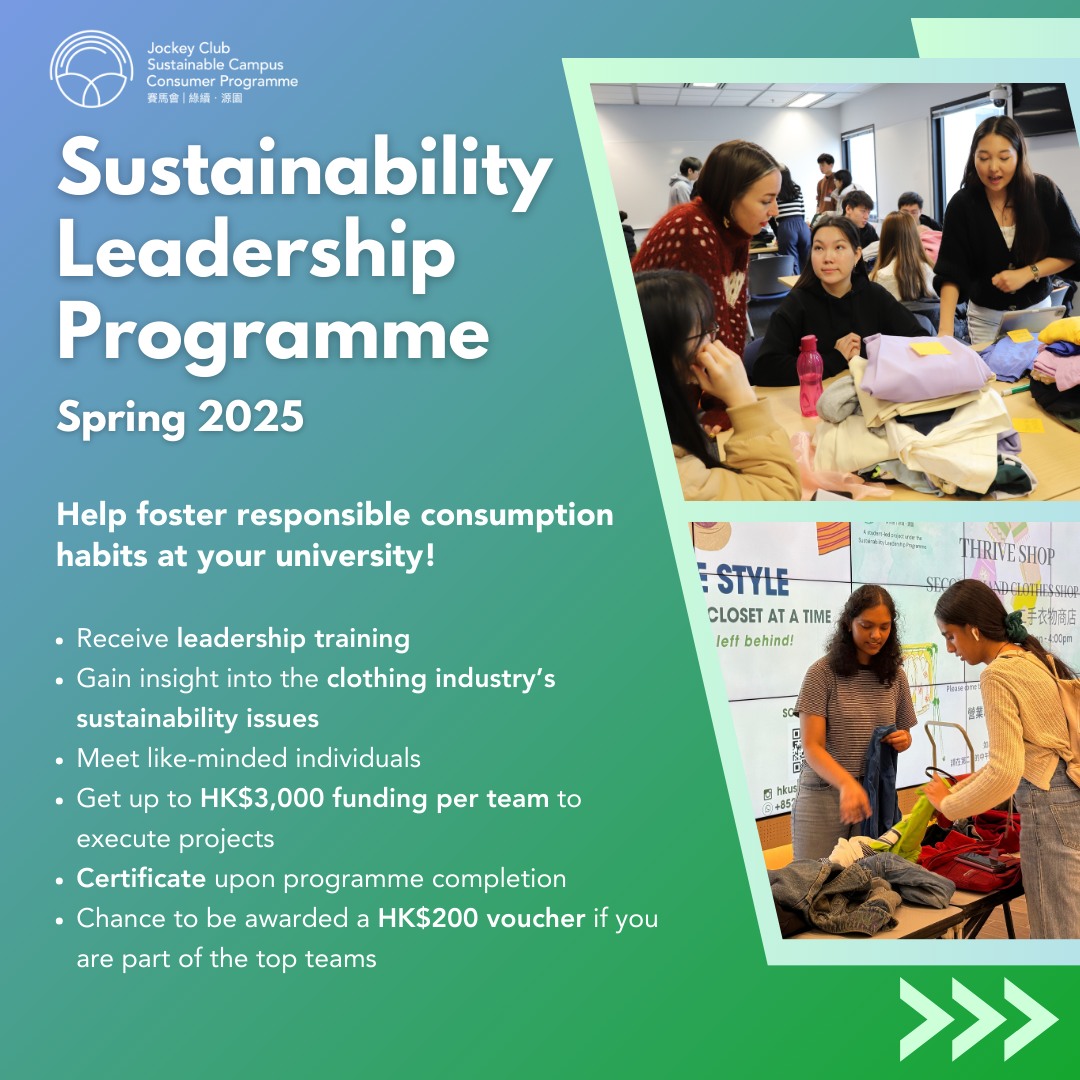Sustainability Campus Leadership Programme and Peer-to-peer Environmental Campaign
The JCSCCP Sustainability Leadership Programme provides leadership training to an annual batch of students, who will then develop and execute projects to promote sustainability and responsible consumption within their campus communities. It empowers students to become future leaders of sustainability, and expands their network by connecting with like-minded individuals from other universities, as well as professionals working in the field.
Participating students will form university-based project teams and receive training relating to the Spring 2025 programme theme of “Rethink Clothing Consumption.” Student teams will develop project ideas to encourage and educate their peers about the problems and solutions to overconsumption in clothing. Each student team can receive up to HK$3,000 in funding to execute their project on respective campuses.
At the end of the programme, students who successfully delivered their projects will be awarded a Certificate of Completion, with students from top three winning teams receiving additional recognition and a HK$200 voucher for a sustainable fashion outlet.
Duration: February - May 2025
No. of Students: 8 students from each university*
* Students from the eight member universities of the Hong Kong Sustainable Campus Consortium (HKSCC) are eligible for the Programme
APPLY NOW
Apply by 2 Feb 2025 (Sun), 11:59pm.
Eligibility
-
UG and PG students from member universities of the HKSCC (CityUHK, CUHK, EdUHK, HKBU, HKU, HKUST, LU, and PolyU) are eligible
-
Students should have a passion for or interest in sustainability
-
Students should have a strong sense of responsibility and motivation, and be able to communicate and align expectations
-
Students be able to speak, read, and write in English (Note: The Programme will be conducted in English)

Important Dates
2 Feb 2025 (Sun), 11:59pm
Student Application Deadline
On or before 5 Feb 2025 (Wed)
Result Announcement by Email of Selected Students
8 Feb 2025 (Sat), 10:00am - 5:30pm
Student Leaders Training (Day 1)
15 Feb 2025 (Sat), 10:00am - 5:30pm
Student Leaders Training (Day 2)
19 Feb 2025 (Wed), 5:00pm
Submission Deadline for Project Proposal
Mar - Apr 2025
Student-led Project Delivery
30 Apr, 2025 (Wed), 5:00pm
Submission Deadline for Project Completion Report
May 2025
Announcement of Winning Projects, Distribution of Certificates and Prizes
It is required for students to attend both training days listed above.
Joining the programme will allow you to…
-
Obtain leadership and hands-on project management skills
-
Gain valuable insights into the clothing industry’s environmental issues and solutions, which are good references for other industries
-
Invited to visit and tour as part of the student leaders’ training:
-
Open Lab by HKRITA (The Hong Kong Research Institute of Textiles and Apparel), a research lab developing agile solutions for the clothing industry
-
CHAT (Centre for Heritage, Arts and Textile) at The Mills
-
-
Connect with like-minded individuals and meet with industry experts
-
Receive up to HK$3,000 funding per project team to execute a project on your campus
-
Receive a Certificate of Completion upon programme completion, and chance to be awarded a HK$200 voucher for a sustainable fashion outlet if you are part of the top team of each of three project categories
Programme Details
Throughout the training workshops, student project teams will develop, then submit a project proposal for the JCSCCP team’s approval, before moving forwards to deliver their student-led project in their respective university communities by the end of April 2025. The projects will be within one of the following project categories:
1. Host a clothing swap party and educational campaign
2. Run a take care and repair workshop and educational campaign
3. Run an upcycling workshop and educational campaign
Upon completing their projects, each project team will be required to submit a Project Completion Report, which will be evaluated by the JCSCCP team to determine the top projects from each project category, receiving the Most Impactful award in each project category.
Skills You Will Develop
-
Sustainability
-
Leadership
-
Project Management
-
Impact Measurement
-
Effective Communication
-
Marketing
-
Education
-
Behavioural Change
Spring 2025 Programme Theme: Rethink Clothing Consumption
Why rethink clothing consumption?
While clothes are an essential part of our lives, it is no secret that the way that our society currently produces and consumes clothes is unsustainable. Fashion brands are now producing 80 to 150 billion clothes each year, consuming vast amounts of natural resources, and contributing significantly to water pollution, greenhouse gas emissions, and textile waste generation.
While transforming the clothing industry to become more sustainable and circular is a systems-wide problem and will require efforts from various stakeholders, as consumers, students can be empowered to drive positive change within their communities, by fostering better clothing habits! By rethinking clothing consumption and shifting our perspective on the clothes we wear, we can contribute towards a more sustainable future of fashion.
What can you do as students?
- Get ‘new’ clothes in a more sustainable way by hosting clothing swaps and considering secondhand
- Extend the life of your clothes by taking care and repairing
- Give value to damaged clothing by upcycling clothes
Through this programme, students will deliver projects on their own campus encouraging their peers to rethink clothing consumption, and foster more sustainable clothing consumption habits.
Enquiries
Charly Cheung
Tel: 3469 2074
Email: charlycheung@ust.hk

